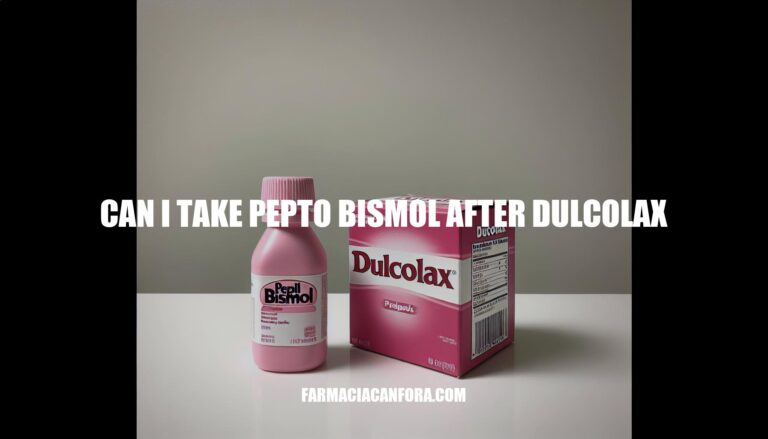


When considering taking Pepto-Bismol after Dulcolax, it’s crucial to understand potential interactions between these medications. Pepto-Bismol (bismuth subsalicylate) is commonly used to treat upset stomach, heartburn, and diarrhea, while Dulcolax (bisacodyl) is a stimulant laxative used to relieve constipation. Combining these medications without proper guidance can lead to unexpected side effects or reduced effectiveness. Therefore, consulting a healthcare professional before using them together ensures safe and effective treatment.
Pepto-Bismol is an over-the-counter medication primarily used to treat digestive issues such as diarrhea, nausea, heartburn, indigestion, and upset stomach. Its active ingredient is bismuth subsalicylate.
How it works: Pepto-Bismol acts as an antacid, reducing excess stomach acid, and has mild antibacterial properties. It coats the stomach lining, protecting it from acid and soothing irritation.
Common side effects: These can include a temporary darkening of the tongue and stool, constipation, and, in rare cases, ringing in the ears.
Dulcolax is a stimulant laxative primarily used to treat constipation and to prepare the bowel for medical procedures like colonoscopies. Its active ingredient is bisacodyl.
Bisacodyl works by stimulating the muscles of the intestines, which increases bowel movements.
Common side effects include:
Serious side effects can include:
Always use Dulcolax as directed by a healthcare provider to minimize risks.
Taking Pepto-Bismol (bismuth subsalicylate) and Dulcolax (bisacodyl) together can lead to some interactions and precautions to consider:
Gastrointestinal Effects: Both medications affect the gastrointestinal tract. Pepto-Bismol can cause constipation, while Dulcolax is a stimulant laxative that induces bowel movements. Using them together might counteract each other’s effects, leading to unpredictable bowel habits.
Electrolyte Imbalance: Dulcolax can cause dehydration and electrolyte imbalances due to its laxative effect. If Pepto-Bismol is used to treat diarrhea, it might mask the dehydration symptoms, complicating the management of fluid and electrolyte balance.
Salicylate Sensitivity: Pepto-Bismol contains salicylate, which can cause adverse effects in individuals sensitive to aspirin or other salicylates. This is particularly important if you have a history of gastrointestinal bleeding or ulcers.
Reye’s Syndrome: Pepto-Bismol should not be used in children or teenagers recovering from viral infections due to the risk of Reye’s syndrome.
Consult Healthcare Provider: Always consult with a healthcare provider before combining these medications to ensure it is safe based on your specific health conditions and other medications you may be taking.
If you have any specific concerns or symptoms, it’s best to discuss them with your healthcare provider.
It’s crucial to consult a healthcare professional before taking Pepto-Bismol after Dulcolax. Here are some key points to discuss with your doctor:
This will help your doctor provide the best advice tailored to your situation.
When considering taking Pepto-Bismol after Dulcolax, it’s crucial to understand potential interactions between these medications. Combining them without proper guidance can lead to unexpected side effects or reduced effectiveness.
Consult a healthcare professional before using them together to ensure safe and effective treatment. Be aware of gastrointestinal effects, electrolyte imbalances, salicylate sensitivity, Reye’s syndrome, and other potential risks.
Discuss your specific health conditions, medications, and symptoms with your doctor to get personalized advice.